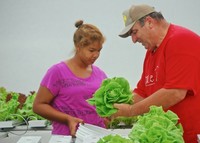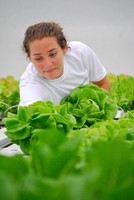Throughout the Old Testament, farmers are instructed to leave a few plants unharvested around the edges of a field for the poor to collect. This practice is called gleaning, and some local farmers and nonprofits are bringing it back.
“Farmers …
This item is available in full to subscribers.
Please log in to continue |


Throughout the Old Testament, farmers are instructed to leave a few plants unharvested around the edges of a field for the poor to collect. This practice is called gleaning, and some local farmers and nonprofits are bringing it back.
“Farmers in Baldwin County are leaving behind enough or donating enough so we can glean, just like in the Old Testament thousands of years ago,” says Lynn Bainbridge, director of Project C.A.R.E. in Robertsdale.
Bainbridge heard about local gleaning through Bay Area Food Bank, a distribution center and resource for nonprofits on the Gulf Coast in Mississippi, Alabama and the Florida panhandle. Farmers who want to donate their fresh fruits and vegetables to local food banks often contact Bay Area Food Bank, and it then sends volunteers to harvest the produce. Local charities like Project C.A.R.E. come to the farms to pick up the harvest and then distribute it to their clients and other nonprofit organizations.
July 12, Craine Creek Farm hosted a gleaning and donated more than 500 heads of lettuce.
“The grocery store this lettuce was going to went bankrupt, so our distributor wouldn't come pick this up,” says Anita Craine.
But Craine says she donates to nonprofits even when orders don't fall through. She thinks it's important to give to people who don't normally have access to fresh fruits and vegetables.
“Part of our crop is gleaned every week — these people don't have lettuce without this,” Craine says. “If we grow food, it's our responsibility we bear to share part of that food with people in the community who wouldn't be able to get it otherwise. As a Christian, I am called of God to have a redemptive influence and purpose in everything I do. You grow a lovely thing that is nutritious, and you realize there are always people who need it. It is a picture of the grace that Christ extends to us.”
Bainbridge says Project C.A.R.E. uses farmers' donations to help teach people that preparing fresh fruits and vegetables doesn't have to be difficult.
“Any time you can get something fresh in their hands, it makes an impact on them, and they realize it is doable,” Bainbridge says. “They realize it's not such a big deal to get fresh beans or fresh corn, and it's not a big imposition on their time. And anything you get that's fresh is better in general. When we have potatoes or the lettuce, or tomatoes, people are very excited.”
Project C.A.R.E. serves about 125 families or 300 individuals a week, so the 500 heads of lettuce harvested from Craine Creek was too much for them to give out alone. Bainbridge says nonprofits in Baldwin County all work together, and she donated the rest of the lettuce to Home of Grace, the Alabama Sheriff's Youth Ranches and Prodisee Pantry.
For more information about local gleaning opportunities, contact Lynn Bainbridge at 251-947-8857 or Bay Area Food Bank at 251-653-1617.